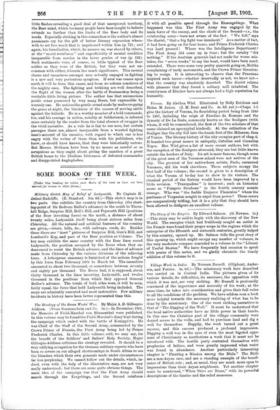Village Work in India. By Norman Russell. (Oliphant, Ander- son,
and Ferrier. 3s. 6d.)—The missionary work here described was carried on in Central India. The pictures given of its various details, its difficulties, its successes, the opposition with which it was met, are very striking. Mr. Russell is profoundly convinced of the importance and necessity of his work ; at the same time, he takes into consideration and gives their full value to all the conditions of the problem. We have seldom seen a book more helpful towards the necessary realising of what has to be done by the missionary. One of the most striking narratives is that of "The Digging of the Well." It must be understood that the local native authorities have no little power in their hands. In this case the Christian part of the village community were denied access to the wells, and had to purchase land and dig a well for themselves. Happily, the work turned out a great success, and this success produced a profound impression. Digging a well was in the eyes of even the most bigoted oppo- nent of Christianity so meritorious a work that it must not be interfered with. The hostile party contented themselves with prophecies of failure, and were greatly impressed when water was found in abundance. Another particularly interesting chapter is " Planting a Mission among the Bhils." The Bhils are a non-Aryan race, and are a standing example of the benefi- cence of British rule; and, as usual, they are much more open to impressions than their Aryan neighbours. Yet another chapter must be mentioned, " When Skies are Brass," with its powerful descriptions of the famine and the relief measures.






































 Previous page
Previous page